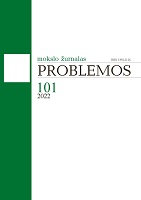Nerimas ir baimė kaip kasdienybės nuotaikos Heideggerio Būtyje ir laike
Anxiety and Fear as Moods of Everydayness in Heidegger’s Being and Time
Author(s): Justinas GrigasSubject(s): Existentialism, Philosophy of Mind, Ontology
Published by: Vilniaus Universiteto Leidykla
Keywords: Fear; anxiety; everydayness; latent; forgetting; ambiguity;
Summary/Abstract: The paper considers the phenomenological analyses of anxiety (Angst) and fear (Furcht) found in Heidegger’s Being and Time. In his work Heidegger considers these moods as the conditions of possibility of everydayness. He claims that anxiety is a mood which, in a latent manner, constantly determines everydayness; however, he does not explicitly clarify the meaning of mood having a “latent” form. The paper argues for the thesis that Heidegger considered “being latent” in terms of the structure of forgetting, which is characteristic to everydayness; the paper investigates the means of everyday forgetting described in Being and Time. The first part of the paper briefly discusses Heidegger’s conception of everydayness. The second part interprets the mood of fear as a primary mode of everyday forgetting and explicates the structure of fear as a self-forgetting participation in everyday concerns. In the third part, three main characteristics of everydayness – idle talk, curiosity and ambiguity – are presented as a means of everyday forgetting. In the course of the analysis, everydayness is revealed as a twofold structure of forgetting.
Journal: Problemos
- Issue Year: 2022
- Issue No: 101
- Page Range: 105-117
- Page Count: 13
- Language: Lithuanian

